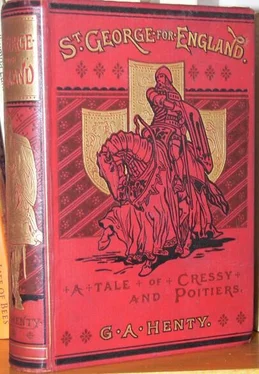G. Henty - St. George for England - A Tale of Cressy and Poitiers
Здесь есть возможность читать онлайн «G. Henty - St. George for England - A Tale of Cressy and Poitiers» весь текст электронной книги совершенно бесплатно (целиком полную версию без сокращений). В некоторых случаях можно слушать аудио, скачать через торрент в формате fb2 и присутствует краткое содержание. Жанр: Старинная литература, на английском языке. Описание произведения, (предисловие) а так же отзывы посетителей доступны на портале библиотеки ЛибКат.
- Название:St. George for England: A Tale of Cressy and Poitiers
- Автор:
- Жанр:
- Год:неизвестен
- ISBN:нет данных
- Рейтинг книги:3 / 5. Голосов: 1
-
Избранное:Добавить в избранное
- Отзывы:
-
Ваша оценка:
- 60
- 1
- 2
- 3
- 4
- 5
St. George for England: A Tale of Cressy and Poitiers: краткое содержание, описание и аннотация
Предлагаем к чтению аннотацию, описание, краткое содержание или предисловие (зависит от того, что написал сам автор книги «St. George for England: A Tale of Cressy and Poitiers»). Если вы не нашли необходимую информацию о книге — напишите в комментариях, мы постараемся отыскать её.
St. George for England: A Tale of Cressy and Poitiers — читать онлайн бесплатно полную книгу (весь текст) целиком
Ниже представлен текст книги, разбитый по страницам. Система сохранения места последней прочитанной страницы, позволяет с удобством читать онлайн бесплатно книгу «St. George for England: A Tale of Cressy and Poitiers», без необходимости каждый раз заново искать на чём Вы остановились. Поставьте закладку, и сможете в любой момент перейти на страницу, на которой закончили чтение.
Интервал:
Закладка:
"Believing that his journey, which had been a secret one, was unknown to the King of France, De Montford went boldly to Paris, where he had been summoned by the king to an assembly of peers called to decide upon the succession. He found, however, that Philip had already obtained news of his journey to England. His manner convinced De Montford that it was unsafe to remain in Paris, and he secretly made his escape. Fifteen days afterward the peers gave judgment in favor of Charles of Blois. The Dukes of Normandy, Burgundy, and Bourbon, the Counts of Alençon, Eu, and Guisnes, and many other French nobles, prepared to lead an army into the field to support Charles, and the king added a body of 3,000 Genoese mercenaries in his pay.
"Knowing the storm that was preparing to break upon him, De Montford put every town and castle in a state of defense. He himself, confiding in the affection of the inhabitants of Nantes, remained in that city, while his wife repaired to Rennes.
"The Duke of Normandy advanced from Angiers with an army of 5,000 men-at-arms and a numerous infantry, and after capturing the castle of Chantoceaux marched to Nantes and laid siege to the city. A sortie was made by the besieged, led by Henry de Leon, but, being attacked by the whole of the French army, they were driven back into the town, a great many of the citizens being killed. A warm altercation took place between Henry de Leon and De Montford, who attributed to him the evil result of the sortie. The result was that a large number of the citizens whose friends had been captured by the French conspired to deliver up the place to Charles of Blois, and Henry de Leon also entered into private negotiations with the Duke of Normandy. De Montford, finding that he could rely neither upon the citizens nor the soldiers, surrendered to the duke on condition that his life was spared. He was sent to Paris, where he still remains a prisoner. Winter was coming on, and after putting Nantes in a fresh state of defense and leaving Charles of Blois there, the Duke of Normandy dismissed his forces, engaging them to reassemble in the spring. Had he pushed on at once he would have experienced no resistance, so great was the panic which the surrender of Nantes and the capture of De Montford had caused among the latter's partisans.
"In Rennes especially the deepest despondency was felt. The countess, however, showed the greatest courage and firmness. Showing herself, with her infant in her arms, she appealed to the citizens, and by her courageous bearing inspired them with new hopes. Having restored heart at Rennes she traveled from garrison to garrison throughout the province, and filled all with vigor and resolution. Feeling, however, the hopelessness of her struggle against all France, she dispatched Sir Almeric de Clisson, who had lately joined her party, to England, to ask the aid which the king had promised. He arrived a month since, and, as you see, our brave king has not been long in dispatching us to her aid; and now, youngsters, to bed, for methinks that the sea is rougher than it was and that the wind is getting up."
"Ay, that is it," the captain, who heard the knight's closing words, exclaimed. "We are in for a storm, and a heavy one, or my name is not Timothy Martin, and though with plenty of sea-room the Kitty makes not much ado about a storm more or less, it's a very different thing in the middle of a fleet of lubberly craft, which may run one down at any time. I shall edge out of them as soon as I can, you may be sure."
Before morning a serious gale was blowing, and for the next three or four days Walter and his companions knew nothing of what was going on. Then the storm abated, and they staggered out from their cabin. The sea was still high, but the sun shone brightly overhead. In front of them the land was visible. They looked round, but to their astonishment not a sail was in sight.
"Why, where is the fleet?" Walter exclaimed in astonishment.
"Snug in the Thames, I reckon," the captain said. "Soon after the storm came on one of the sailors pretended he saw the lights of recall on the admiral's ship; but I was too busy to look that way; I had enough to do to look after the safety of the ship. Anyhow, I saw no more of them."
"And what land is that ahead?" Walter asked.
"That is Brittany, young sir, and before nightfall we shall be in the port of Hennebon; as to the others, it may be days and it may be weeks before they arrive."
The lads were not sorry at the chance which had taken them to their destination before their companions and had given them a chance of distinguishing themselves. Late in the afternoon the ship dropped anchor off the castle of Hennebon, and Sir John Powis and his following were conveyed in the ship's boats to shore. The countess received them most graciously, and was delighted at the news that so strong a force was on its way to her aid.
"In the absence of Sir Walter Manny, madam, I place myself and my men at your orders. Our horses will be landed the first thing in the morning, and we will then ride whithersoever you may bid us."
"Thanks, Sir John," the countess replied. "In that case I would that you ride by Rennes, toward which the army of the Duke of Normandy is already advancing. The garrison there is commanded by Sir William of Caddoudal, a good and valiant knight."
The horses were landed on the following morning, and accompanied by the four young squires and the men-at-arms, and followed by the twenty archers on foot, Sir John Powis set out for Rennes. They arrived there, but just in time, for the assailants were closing round the city. They were received with the greatest cordiality by the governor, who assigned apartments to Sir John and the squires, and lodged the men-at-arms and archers near them.
In a day or two the whole of the French army came up, and the siege commenced. Sir John Powis, his own request, was posted with his men for the defense of a portion of the wall which was especially open to the assaults of the enemy. These soon commenced in earnest, and the Genoese and Spanish mercenaries endeavored to carry the place by assault. Sometimes one point would be attacked, at others points far distant. Covered by the fire of the French cross-bowmen, the Spaniards and Germans came on to the assault, carrying ladders, with which they strove to climb the walls, but the defenders plied them so vigorously with quarrels from their cross-bows and flights of arrows that they frequently desisted before reaching the walls. When they pushed on, and strove to ascend, their luck was no better. Great stones were hurled down, and boiling oil poured upon them. The ladders were flung back, and many crushed by the fall, and in none of the assaults did they gain any footing in the town. Machines were used, but these were not sufficiently powerful to batter down the walls, and at the end of April the city was as far from being captured as it was on the day of the commencement of the siege.
Walter bore his full share in the fighting, but he had no opportunity of especially distinguishing himself, although Sir John several times commended him for his coolness when the bolts of the cross-bowmen and the stones from the machines were flying most thickly. But although as yet uninjured by the enemy's attacks, the prospect of the city holding out was not bright. The burghers, who had at first fought valiantly, were soon wearied of the strife, and of the hardships it entailed upon them. The siege had continued but a short time when they began to murmur loudly. The force under the command of the governor was but a small one, and it would have been impossible for him to resist the will of the whole population. For a time his exhortations and entreaties were attended with success, and the burghers returned to their positions on the walls; but each time the difficulty became greater, and it was clear to Caddoudal and Sir John Powis that ere long the citizens would surrender the place in spite of them. The English knight was furious at the cowardliness of the citizens, and proposed to the governor to summon twenty of the leading burghers, and to hang them as a lesson to the others; but the governor shook his head.
Читать дальшеИнтервал:
Закладка:
Похожие книги на «St. George for England: A Tale of Cressy and Poitiers»
Представляем Вашему вниманию похожие книги на «St. George for England: A Tale of Cressy and Poitiers» списком для выбора. Мы отобрали схожую по названию и смыслу литературу в надежде предоставить читателям больше вариантов отыскать новые, интересные, ещё непрочитанные произведения.
Обсуждение, отзывы о книге «St. George for England: A Tale of Cressy and Poitiers» и просто собственные мнения читателей. Оставьте ваши комментарии, напишите, что Вы думаете о произведении, его смысле или главных героях. Укажите что конкретно понравилось, а что нет, и почему Вы так считаете.












